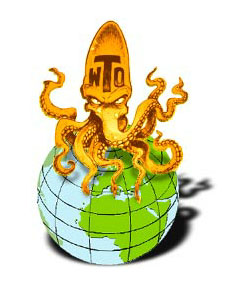|
Top 10 Reasons to Oppose the World
Trade Organization
1. The WTO only serves the interests of
multinational corporations.
The policies of the WTO impact all aspects of society and the
planet, yet the WTO rules are written by and for corporations
with inside access to the negotiations. Citizen input by consumer,
environmental, human rights and labor organizations is consistently
ignored. Even requests for information are denied, and the proceedings
are held in secret
2. The WTO is a stacked court.
The WTO's dispute panels, which rule on whether domestic laws
are "barriers to trade" and should therefore be abolished,
consist of three trade bureaucrats who are not screened for conflict
of interests.
3. The WTO tramples over labor and human
rights.
The WTO has refused to address the impacts of free trade on labor
rights, despite that fact that countries that actively enforce
labor rights are disadvantaged by countries that consistently
violate international labor conventions. Many developing countries,
such as Mexico, contend that labor standards constitute a "barrier
to free trade" for countries whose competitive advantage
in the global economy is cheap labor. Potential solutions to
labor and human rights abuses are blocked by the WTO, which has
ruled that it is: 1) illegal for a government to ban a product
based on the way it is produced (i.e.with child labor); and 2)
governments cannot take into account the behavior of companies
that do business with vicious dictatorships such as Burma.
4. The WTO is destroying the environment.
The WTO is being used by corporations to dismantle hard-won environmental
protections, who call them barriers to trade. In 1993 the very
first WTO panel ruled that a regulation of the US Clean Air Act,
which required both domestic and foreign producers alike to produce
cleaner gasoline, was illegal. Recently, the WTO declared illegal
a provision of the Endangered Species Act that requires shrimp
sold in the US to be caught with an inexpensive device that allows
endangered sea turtles to escape.
5. The WTO is killing people.
The WTO's fierce defense of intellectual property rights-patents,
copyrights and trademarks-comes at the expense of health and
human lives. The organization's support for pharmaceutical companies
against governments seeking to protect their people's health
has had serious implications for places like sub-Saharan Africa,
where 80 percent of the world's new AIDS cases are found. The
US government, on behalf of US drug companies, is trying to block
developing countries' access to less expensive, generic, life-saving
drugs.

6. The US adoption of the WTO was undemocratic.
The WTO was established out of the Uruguay Round of the General
Agreement on Tariffs and Trade (GATT) negotiations. On December
1, 1994, Congress approved GATT under 'fast track' during a lame
duck session of Congress. 'Fast track' limits public debate by
not allowing amendments. The approval of the WTO required entire
sections of US laws to be rewritten to conform with the WTO rules,
similar to the way that treaties often redefine how the US will
interact with other states. Had the agreement been voted on as
a treaty, requiring a two-thirds majority in the Senate, it would
have been defeated.
7. The WTO undermines local development
and penalizes poor
countries.
The WTO's "most favored nation"
provisions requires all WTO member countries to treat each other
equally and to treat all corporations from these countries equally
regardless of their track record. Local policies aimed at rewarding
companies who hire local residents, use domestic materials, or
adopt environmentally sound practices are essentially illegal
under the WTO. Under the WTO rules, developing countries are
prohibited from following the same polices that developed countries
pursued, such as protecting nascent, domestic industries until
they can be internationally competitive.
8. The WTO is increasing inequality.
Free trade is not working for the majority of the world. During
the most recent period of rapid growth in global trade and investment
- 1960 to 1998 - inequality worsened both internationally and
within countries. The UN Development Program reports that the
richest 20 percent of the world's population consume 86 percent
of the world's resources while the poorest 80 percent consume
just 14 percent. WTO rules have hastened these trends by opening
up countries to foreign investment and thereby making it easier
for production to go where the labor is cheapest and most easily
exploited and environmental costs are low. This pulls down wages
and environmental standards in developed countries who are having
to compete globally.
9. The WTO undermines national sovereignty.
By creating a supranational court system that has the power to
economically sanction countries to force them to comply with
its rulings, the WTO has essentially replaced national governments
with an unelected, unaccountable corporate-backed government.
Under the WTO, governments can no longer act in the public interest.
10. The tide is turning against free trade
and the WTO!
There is a growing international backlash against the WTO and
the process of corporate globalization over which it presides.
Movement-building by coalitions such as People's Global Action
against the WTO in Europe and the Citizen's Trade Campaign in
the US are growing fast, as public support for corporate-managed
free trade dwindles. Recent polls show that 58 percent of Americans
agree that foreign trade has been bad for the US economy, and
81 percent of Americans say that Congress should not accept trade
agreements that give other countries the power to overturn US
laws. (Too late!).
The above list comes from the Global Exchange
website at www.globalexchange.org
Other Articles About the WTO in this Issue
Global Free Logging: Defend Our Forests - Clearcut the WTO
This Is What Democracy Looks Like - The WTO Protests in Seattle
What Will Be Next - The WTO's Anti-Environmental Record
|


